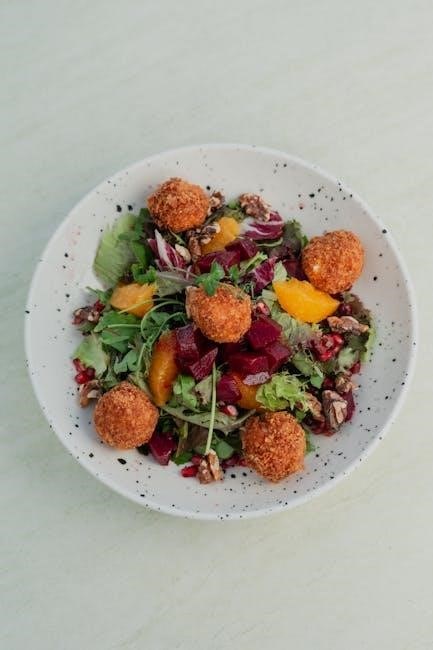Plant-based foods are derived from plants, excluding animal products, and offer a healthier, more sustainable lifestyle choice. They reduce chronic disease risks and support environmental health.
1.1 Overview of Plant-Based Diets
A plant-based diet focuses on foods derived from plants, emphasizing fruits, vegetables, whole grains, legumes, nuts, and seeds; It minimizes processed items and excludes animal products, promoting health and sustainability. This approach reduces chronic disease risks and supports environmental health, offering a balanced and nutritious lifestyle choice for individuals seeking a healthier diet.
1.2 Importance of a Plant-Based Food List
A well-organized plant-based food list is essential for ensuring balanced nutrition and variety in meals. It helps individuals understand key food categories, such as fruits, vegetables, legumes, and whole grains, making grocery shopping efficient. This list also aids in avoiding nutritional deficiencies and supports a sustainable, healthy lifestyle by providing clear guidance on essential plant-based foods to include in daily meals.
Fruits
Fruits are a vibrant and essential part of a plant-based diet, offering vitamins and minerals. Common options include berries, apples, and bananas, while exotic choices like durian provide variety and additional nutrients.
2.1 Common Fruits
Common fruits like apples, bananas, and berries are staples in plant-based diets, offering essential vitamins and minerals. Oranges, grapes, and pears provide natural sweetness and hydration. Berries, such as strawberries and blueberries, are rich in antioxidants, while citrus fruits like lemons and limes add versatility to recipes. These fruits are easily accessible and form the foundation of a healthy, balanced diet, supporting energy and overall well-being.
2.2 Exotic Fruits
Exotic fruits like mangoes, pineapples, and dragon fruit add vibrant flavors to plant-based diets. Kiwi, papaya, and pomegranate are rich in vitamins and antioxidants. These fruits offer unique textures and tastes, enhancing meals while providing essential nutrients. Incorporating exotic varieties diversifies your diet and supports overall health, making them a great addition to a plant-based lifestyle.

Vegetables
Vegetables are a cornerstone of plant-based diets, offering essential vitamins, minerals, and fiber. They come in diverse forms, from leafy greens to vibrant, nutrient-rich options like bell peppers and broccoli.
3.1 Leafy Greens
Leafy greens are a vital component of a plant-based diet, providing abundant nutrients like iron, calcium, and vitamins. Spinach, kale, arugula, and collard greens are popular choices, rich in antioxidants and fiber, supporting overall health. Incorporating these into meals like salads or smoothies can enhance nutritional intake and contribute to a balanced diet. They are versatile and highly recommended for daily consumption.
3;2 Root Vegetables
Root vegetables are versatile and nutrient-rich, offering a variety of flavors and textures. Carrots, beets, sweet potatoes, and turnips are popular choices, providing essential vitamins, minerals, and fiber. They can be enjoyed raw in salads or cooked in soups, stews, and roasted dishes. Incorporating root vegetables into meals enhances nutrition and adds natural sweetness, making them a great addition to a plant-based diet.

Legumes
Legumes are protein-rich, versatile, and packed with fiber and nutrients. Common types include lentils, beans, chickpeas, and peas, ideal for soups, salads, and main dishes.
4;1 Types of Legumes
Legumes include various beans like kidney, black, and pinto beans, as well as lentils, chickpeas, and peas. They are rich in protein, fiber, and essential nutrients, making them a cornerstone of plant-based diets. These versatile foods are perfect for soups, stews, salads, and main dishes, offering numerous health benefits and culinary possibilities.
Whole Grains
Whole grains like quinoa, brown rice, oats, barley, and rye are rich in fiber, vitamins, and minerals. They support digestive health and provide sustained energy.
5.1 Common Whole Grains
Common whole grains include brown rice, quinoa, oats, barley, rye, and whole-wheat bread. These grains are rich in fiber, vitamins, and minerals, offering numerous health benefits. They provide sustained energy and support digestive health. Incorporating these into your diet is essential for a balanced plant-based lifestyle.
Nuts and Seeds
Nuts and seeds are versatile, nutrient-dense additions to plant-based diets, offering protein, healthy fats, and fiber. They enhance recipes and provide essential vitamins and minerals.
6.1 Popular Nuts
Popular nuts like almonds, walnuts, cashews, and pecans are rich in healthy fats, protein, and fiber. They are versatile in recipes, snacks, and as toppings. Almonds are high in vitamin E, while walnuts excel in omega-3 fatty acids. Cashews are a great source of magnesium, and pecans offer antioxidants. Nuts support heart health and satisfy hunger, making them excellent additions to a plant-based diet. Use them in moderation for balanced nutrition.
- Almonds
- Walnuts
- Cashews
- Pecans
6.2 Healthy Seeds
Healthy seeds like chia, flax, hemp, sunflower, and pumpkin are nutrient-dense additions to a plant-based diet. Chia seeds are rich in omega-3s and fiber, while flaxseeds support heart health. Hemp seeds provide complete protein, and sunflower seeds are high in vitamin E. Pumpkin seeds offer zinc and antioxidants. Incorporate them into meals for added nutrition and texture, but consume in moderation due to their calorie content.
- Chia seeds
- Flaxseeds
- Hemp seeds
- Sunflower seeds
- Pumpkin seeds
Healthy Fats
Plant-based healthy fats are essential for a balanced diet. Avocados, nuts, seeds, and olive oil are great sources, offering nutrients without animal products.
7.1 Sources of Plant-Based Fats
Plant-based fats are derived from whole foods like avocados, nuts, seeds, and olives. These sources provide essential nutrients, including monounsaturated and polyunsaturated fats, supporting heart health and satiety. Coconut oil and nut butters also contribute to this category. Incorporating these minimally processed options ensures a nutrient-rich, balanced diet while avoiding harmful processed fats.
Plant-Based Dairy Alternatives
Plant-based dairy alternatives include milk (almond, soy, oat, rice), yogurt, and cheese substitutes. These options are free from animal products, offering sustainable and ethical choices for diets.
8.1 Milk Alternatives
Plant-based milk alternatives offer a variety of options, including almond, soy, oat, and rice milk. These choices are free from dairy, making them ideal for those avoiding lactose or animal products. Many are fortified with calcium and vitamins, ensuring nutritional value while catering to diverse tastes and dietary needs in a sustainable way.
8.2 Other Dairy Substitutes
Plant-based dairy substitutes include vegan butter, yogurt, cheese, and ice cream. Made from coconut oil, almond, cashew, or oat, these products mimic traditional dairy textures and flavors. They are free from cholesterol and saturated fats, offering healthier alternatives. Ideal for those with lactose intolerance or preferring cruelty-free options, these substitutes are versatile in cooking and baking, supporting a fully plant-based diet.
Benefits of a Plant-Based Diet
A plant-based diet reduces chronic disease risks, supports weight management, and promotes environmental sustainability by lowering greenhouse gas emissions and conserving resources.
9.1 Health Advantages
A plant-based diet offers numerous health benefits, including reduced risks of heart disease, type 2 diabetes, and certain cancers. It is rich in vitamins, minerals, antioxidants, and fiber, promoting overall well-being. Plant-based foods help lower cholesterol, improve blood sugar control, and support healthy weight management. Additionally, they enhance gut health and reduce inflammation, contributing to a longer, healthier life.
- Rich in essential nutrients like vitamins and minerals.
- High in antioxidants and fiber.
- Supports heart health and weight management.
- May reduce chronic disease risks.
9.2 Environmental Impact
Adopting a plant-based diet significantly reduces environmental impact by lowering greenhouse gas emissions, water usage, and land degradation. Plant-based foods require fewer resources to produce and transport, reducing pollution and biodiversity loss. This sustainable choice supports eco-friendly agriculture and helps combat climate change, making it a vital step toward a healthier planet for future generations.
- Reduces greenhouse gas emissions.
- Lowers water and land use.
- Decreases pollution and supports biodiversity.
- Encourages sustainable farming practices.
Tips for Incorporating Plant-Based Foods
Start by planning meals, using a grocery list, and gradually substituting animal products with plant-based alternatives to ensure a balanced and nutritious transition.
10.1 Starting with Plant-Based Meals
Begin by planning meals using a grocery list to ensure variety and nutrition. Start with familiar dishes, substituting animal products with plant-based alternatives like lentils or tofu. Simple ideas include vegan soups, stir-fries, or salads. Experiment with new ingredients gradually to avoid overwhelming your palate. Incorporate whole grains and legumes for protein-rich meals. Keep it fun and flexible, allowing time to adjust and explore new flavors for a sustainable transition.
10.2 Balancing Nutrients
A plant-based diet requires careful attention to nutrient balance. Focus on variety, including legumes, whole grains, nuts, and seeds for protein. Incorporate leafy greens for iron and calcium, and fortified foods for B12. Healthy fats like avocados and olives support heart health. Aim for vibrant, colorful meals to ensure a wide range of vitamins and minerals. Consult a healthcare provider for personalized advice to maintain optimal nutrition.

Meal Planning and Recipes
Plan meals using a plant-based foods PDF list, featuring breakfast ideas, hearty salads, and vibrant dinners. Explore global cuisines for inspiration and simple, nutritious recipes to enjoy daily.
11.1 Breakfast Ideas
Start your day with vibrant plant-based breakfasts like chia pudding, smoothie bowls, or tofu scrambles. Incorporate whole grains such as oats or quinoa for hearty options. Fresh fruits, nuts, and seeds add natural sweetness and crunch. Try avocado toast or plant-based yogurt parfaits for quick, nutritious meals. Experiment with global flavors like chickpea omelets or banana pancakes. These ideas, featured in your plant-based foods PDF list, ensure a delicious and energizing start every morning.
11.2 Lunch and Dinner Options
Explore hearty plant-based lunches like vibrant salads, stuffed wraps, or quinoa bowls. For dinner, try lentil curries, veggie stir-fries, or pasta with marinara. Roasted vegetable casseroles and chickpea patties are satisfying options. Incorporate international flavors with dishes like vegan sushi rolls or black bean tacos. These versatile recipes, highlighted in your plant-based foods PDF, offer variety and nutrition for every meal, catering to diverse tastes and dietary needs.
Shopping Smart
Plan meals, write lists, and buy in bulk to save money. Opt for seasonal produce and frozen options to reduce costs. Always check labels for hidden animal products or by-products to ensure items align with your plant-based diet goals.
12.1 Essential Items to Buy
Stock up on fresh fruits, vegetables, and leafy greens like spinach and kale. Include legumes such as lentils, chickpeas, and black beans for protein. Whole grains like brown rice, quinoa, and oats are staples. Don’t forget nuts, seeds, and healthy fats like avocados and olive oil. Plant-based milk alternatives and tofu are also must-haves for a well-rounded diet. Buy in bulk to save money and reduce waste.
12.2 Budget-Friendly Tips
Plan meals and write a shopping list to avoid impulse buys. Buy seasonal fruits and vegetables, as they are often cheaper. Opt for frozen or canned options, which are affordable and long-lasting. Purchase bulk items like grains, beans, and nuts to save money. Consider store-brand or generic products, which are often priced lower than name-brand alternatives. Shop at local markets or use coupons for additional savings.

Common Mistakes to Avoid
Avoid over-reliance on processed foods and ensure balanced nutrient intake. Don’t neglect protein sources like legumes and whole grains, and watch for hidden animal-derived ingredients in products.
13.1 Pitfalls in Plant-Based Eating
One common pitfall is relying too heavily on processed foods, which can be high in unhealthy additives. Additionally, neglecting essential nutrients like iron, calcium, and vitamin B12 is a mistake. Many plant-based dieters also overconsume nuts and seeds, leading to calorie imbalances. Furthermore, assuming all plant-based products are healthy can be misleading, as some contain excessive sugar or salt. Lastly, ignoring the importance of variety can result in nutrient deficiencies over time.
Embracing a plant-based lifestyle offers numerous health and environmental benefits. Access the free PDF list for a comprehensive guide to making informed, sustainable food choices. Further reading and community support are available through resources like EatMoveRest and Roskachestvo, providing additional insights and practical tips for maintaining a balanced and nutritious plant-based diet. Explore these resources to enhance your journey toward a healthier, more sustainable lifestyle. By leveraging these tools, you can make informed decisions and enjoy the rewards of a whole food plant-based approach. Start your transformation today!
14.1 Accessing the PDF List
To access the comprehensive plant-based foods PDF list, visit trusted resources like EatMoveRest or Roskachestvo. These platforms offer free downloadable guides, including grocery lists and meal plans. Subscribe to newsletters or join communities like EatMoveRest for exclusive access. The PDF provides detailed categories, from fruits and vegetables to legumes and whole grains, ensuring a well-rounded approach to a plant-based lifestyle. Print and use it for easy grocery shopping and meal planning.
14.2 Further Reading and Support
For deeper insights, explore articles on Harvard T.H. Chan School of Public Health and Roskachestvo. Websites like EatPlant-Based.com offer detailed guides and expert interviews. Join communities like EatMoveRest for support and resources. These platforms provide evidence-based advice, recipes, and tips to help you thrive on a plant-based diet, ensuring you stay informed and motivated throughout your journey.



